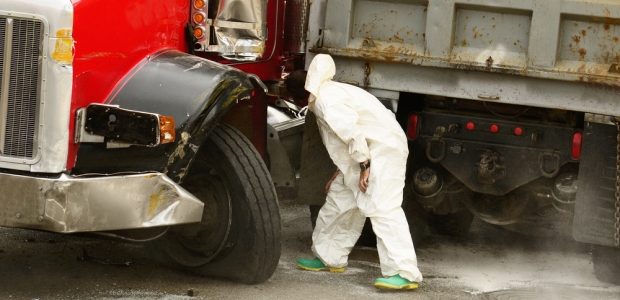
FMCSA Seeks Comments on Crash Preventability Demonstration Program
FMCSA said it will consider a crash non-preventable if the commercial motor vehicle was hit by a motorist who was convicted of one of these offenses, or a related offense: DUI, driving the wrong direction, striking the CMV in the rear, or striking the CMV while it was legally stopped.
The Federal Motor Carrier Safety Administration plans to carry out a demonstration of a program to conduct preventability determinations on certain less-complex motor carrier crashes. The agency will accept requests for data reviews that seek to establish the non-preventability of certain crashes through its national data correction system known as DataQs, when documentation establishes the crash was not preventable by the motor carrier or commercial driver. The proposed minimum time period for this crash preventability demonstration program would be two years.
This stems from FMCSA's study in 2015 of the feasibility of using motor carriers' role in crashes to assess their safety -- specifically, whether police accident reports are sufficient to support crash-weighting determinations that would be an even stronger predictor of crash risk than overall crash involvement, and how the agency could manage a process for making those determinations.
In response, the American Trucking Associations (ATA) listed types of non-preventable crashes that, when supported by documentation, could be removed from those motor carriers' records, and ATA also recommended that FMCSA consider a crash non-preventable when an individual commits suicide or vehicles are incapacitated by animals. In its new Federal Register notice, FMCSA said it will consider a crash non-preventable if the commercial motor vehicle was hit by a motorist who was convicted of one of these offenses, or a related offense: DUI, driving the wrong direction, striking the CMV in the rear, or striking the CMV while it was legally stopped.
FMCSA said it is interested in information related to those four crash scenarios that would be useful for its demonstration program. Requests for data review would have to include evidence of a conviction to show that the crash wasn't preventable by the motor carrier or the driver, and it should contain all available law enforcement reports, insurance reports from all parties involved in the crash, and any other relevant information, the notice states, adding that FMCSA seeks input on what other documentation would be sufficient to make this determination.
The notice states that motor carriers with a high percentile in FMCSA's Crash Indicator BASIC have crash rates 85 percent higher than the national average.
Comments are due within 60 days; visit www.regulations.gov and search for Docket No. FMCSA-2014-0177.